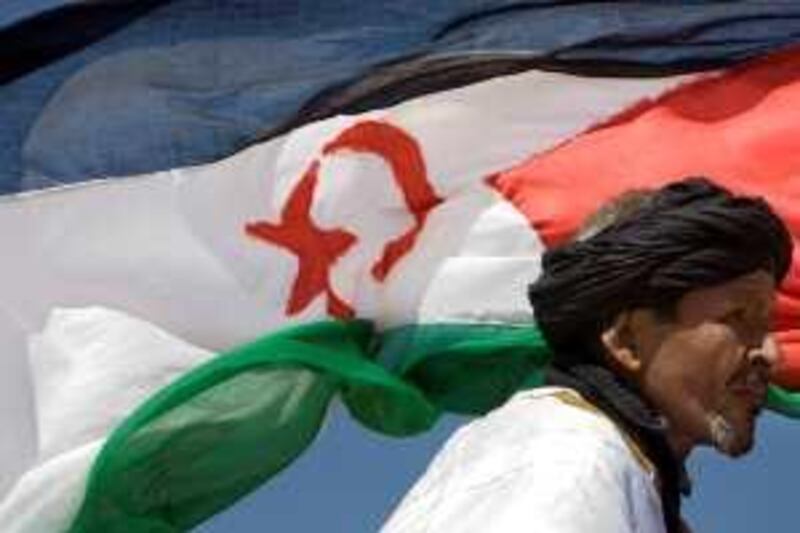LAAYOUNE // With a sea of angry demonstrators advancing under a cloud of Moroccan flags, El Ghalia Djimi, a human-rights activist from the disputed territory of Western Sahara, turned to the nearest thing that looked like help: the United Nations.
"A Minurso car pulled up with two westerners inside, and I tried to introduce myself in my broken English," Mrs Djimi said, referring to the UN's peacekeeping mission in Western Sahara, a former Spanish colony largely annexed by Morocco in 1975. "But they just told me, 'We are not from here', and drove off." Pro-Moroccan demonstrators, egged on by police, proceeded to attack Mrs Djimi and fellow Saharawi activists arriving at the airport in Laayoune, Western Sahara's main city, she said. Officials from the UN mission, Minurso, in Laayoune could not be reached for comment.
As Minurso, which stands for Mission des Nations Unies pour l'Organisation d'un Référendum au Sahara Occidental, comes up for renewal today by the security council, Western Sahara's independence movement, the Algerian-backed Polisario Front, is demanding that UN peacekeepers start monitoring human rights, threatening otherwise to cut relations with them and back out of UN-led peace talks with Morocco. Human rights groups say that police in Western Sahara have detained and beaten pro-independence campaigners, charges Morocco denies, while Morocco in its turn accuses some Saharawi activists of working for the Polisario.
While alleged abuses by police have decreased in recent months, activists said, authorities in Western Sahara have encouraged rowdy street demonstrations by Moroccan civilians to harass pro-independence Saharawis, raising fears of a return to the ethnic violence that gripped Laayoune in 1999. This month the Polisario sent a letter to Ban Ki-Moon, the UN secretary general, complaining that his latest report on Western Sahara downplayed alleged human rights abuses by Moroccan authorities.
"We noted with hope your reference in recent reports on Western Sahara to the UN's duty to 'uphold human rights standards in all its operations, including those relating to Western Sahara'," wrote Mohamed Abdelaziz, the Polisario secretary general. "If such a duty exists, it is incomprehensible that your report does not include a suggestion or concrete recommendation as to how this should occur." Mr Ban said in a statement last week after a meeting in New York with Mr Abdelaziz that he is "very concerned" about alleged human rights violations in Western Sahara. However, he has not recommended altering Minurso's mandate.
Morocco supports Minurso's current activities, consisting mainly of monitoring the ceasefire. Mohamed Salem Ould Salek, Polisario's foreign minister, said the organisation's future relations with Minurso depend on how the security council defines the mission's role: "It could be anywhere from a minimal revision to complete rupture." While supporting a peaceful solution to the conflict, the Polisario may also abandon UN-mediated peace talks begun last summer, Mr Ould Salek said.
Those talks are the latest attempt to resolve the three-decade conflict, which severely stifles economic growth in North Africa and divides 200,000 Saharawis between Western Sahara and Polisario-run refugee camps in the Algerian desert. The trouble began in 1975, when Morocco invaded Western Sahara after its Spanish colonisers withdrew. The Polisario fought a guerrilla war until the UN brokered a ceasefire in 1991 intended to allow an independence referendum, which foundered on disagreements over who should vote.
The Polisario still wants a referendum with independence as an option. Morocco rules that out, proposing a degree of autonomy it says would satisfy Saharawi calls for self-determination. Some Saharawis agree. "I wanted to tell those people that they don't represent me," said Salhi Abdallah Ould Brahim, a state-approved sheikh who protested at Laayoune airport as pro-independence activists arrived from a visit to the Polisario refugee camps.
According Mr Ould Brahim, police at the airport restrained a crowd of mostly Saharawi demonstrators. "If the police hadn't been there, people could have been killed." However, Mrs Djimi, the vice-president of the Saharawi Association for Human Rights Victims, said most demonstrators were Moroccan, wearing traditional Saharawi robes and encouraged by police who made minimal effort to control them when things got out of hand.
"The demonstrators formed a gauntlet by the door, stabbing at the Saharawi activists with the points of their flags and trying to lay hands on them," she said. "After we got into our cars they crowded around and started breaking the windows with sticks and stones." Security officials in Laayoune said they were not authorised to talk to the media. The state newswire, MAP, described demonstrators as Saharawis and did not mention crowd violence.
@Email:jthorne@thenational.ae





